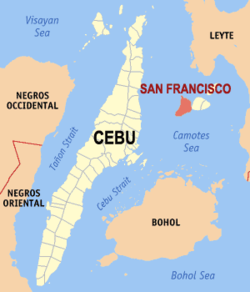Pacijan Island
| San Francisco | |
|---|---|
| Municipality | |

Mangodlong Rock Beach Resort
|
|
 Map of Cebu with San Francisco highlighted |
|
| Location within the Philippines | |
| Coordinates: 10°39′N 124°21′E / 10.65°N 124.35°ECoordinates: 10°39′N 124°21′E / 10.65°N 124.35°E | |
| Country | Philippines |
| Region | Central Visayas (Region VII) |
| Province | Cebu |
| District | 5th district of Cebu |
| Barangay | 15 (see § Barangays) |
| Government | |
| • Type | Sangguniang Bayan |
| • Mayor | Aly Arquillano (BAKUD) |
| • Vice mayor | Allan Arquillano |
| • Town Council |
Members
|
| • Representative | Red Durano |
| Area | |
| • Total | 106.93 km2 (41.29 sq mi) |
| • Water | 6.80 km2 (2.63 sq mi) |
| Population (2015 census) | |
| • Total | 55,180 |
| • Density | 520/km2 (1,300/sq mi) |
| • Voter (2016) | 27,484 |
| Time zone | PHT (UTC+8) |
| ZIP code | 6050 |
| IDD : area code | +63 (0)32 |
| Income class | 3rd class |
| PSGC | 072242000 |
San Francisco is a 3rd municipal income class municipality on Camotes Islands in the province of Cebu, Philippines. According to the 2015 census, it has a population of 55,180. In the 2016 electoral roll, it had 27,484 registered voters.
San Francisco consists primarily of Pacijan Island (also known as Pajican Island), as well as the tiny Tulang islet just north of Pacijan. Both islands are part of the Camotes Islands group in the Camotes Sea (that also includes Poro Island and Ponson Island). They are located east of the main island of Cebu, south and west of Leyte and north of Bohol.
Pacijan Island is about 14.75 kilometres (9.17 mi) long and 8.5 kilometres (5.3 mi) wide. A 1,400-metre (1,500 yd) causeway crosses the mangrove swamp to connect Pacijan and Poro Island. It was constructed during the Spanish era, to bridge the islands for easier trading and attending services in Poro church.
San Francisco comprises 15 barangays:
In the 2016 electoral roll, it had 27,484 registered voters, meaning that 50% of the population are aged 18 and over.
Tulang island (known locally as Tulang Diot) is a five-minute boat ride from Tulang Dako on the main island of Pacijan. Both Tulang Diot and Tulang Dako are part of barangay Esperanza. The islet is almost entirely covered with coconut palms and measures about 1.6 by 0.6 kilometres (1.0 by 0.4 mi): the residential area is confined to a small triangle at the southern end. Total area about 40 ha (100 acres), of which only 3.5 ha (8.6 acres) (8.8%) is inhabited.
Carl Guthe, director of the University of Michigan Anthropological Museum, during his 1923-25 collecting trip and explorations of archaeological sites in the Philippines, conducted an archeological dig in a cave site on Tulang. Located on the southeastern coast of the island, the cave measures about 3.7 by 2.7 metres (12 by 9 feet). Guthe reported it to contain bone fragments and teeth of about 60 individuals. Associated grave goods included earthenware pottery, shell bracelets, bronze and iron artefacts (iron tang, bronze chisel, iron blade), glass and stone beads, hammerstone and pestle. Filed teeth were also recovered from this site.
...
Wikipedia

